Piano Sheet Music
 "... all of the great sounds that James Burton and Jimmy Bryant were getting, came out of Telecasters" Albert Lee
"... all of the great sounds that James Burton and Jimmy Bryant were getting, came out of Telecasters" Albert Lee
Charles-Valentin Alkan
Charles-Valentin Alkan (French: ; 30 November 1813 – 29 March 1888) was a French-Jewish composer and virtuoso pianist. At the height of his fame in the 1830s and 1840s he was, alongside his friends and colleagues Frédéric Chopin and Franz Liszt, among the leading pianists in Paris, a city in which he spent virtually his entire life.Alkan earned many awards at the Conservatoire de Paris, which he entered before he was six. His career in the salons and concert halls of Paris was marked by his occasional long withdrawals from public performance, for personal reasons. Although he had a wide circle of friends and acquaintances in the Parisian artistic world, including Eugène Delacroix and George Sand, from 1848 he began to adopt a reclusive life style, while continuing with his compositions – virtually all of which are for the keyboard.
Traditional

Big Mama

Big Mama is a South Korean female vocal group that debuted in 2003. The group is known for focusing on its members' singing abilities rather than their looks. The group disbanded in 2012 after their last song "Cleaning My Closet" On June 10, 2021, it was announced Big Mama would be reuniting to release new music.
Rurouni Kenshin

Rurouni Kenshin: Meiji Swordsman Romantic Story is a Japanese manga series written and illustrated by Nobuhiro Watsuki with an anime adaptation. The fictional setting takes place during the early Meiji period in Japan. The story is about a fictional assassin named Himura Kenshin, formerly known as the "Hitokiri Battōsai" ("Hitokiri Battōsai"? or "Battosai the Manslayer" in the English dub). Kenshin later grieves for all the lives he has taken, and vows that he will never kill again.
The manga initially appeared in Shueisha's Weekly Shōnen Jump from September 2, 1994, to November 4, 1999. The complete work consists of 28 tankōbon volumes which have sold over 47 million copies in Japan as of 2007. The United States release of the manga has been completed by Viz Media. Rurouni Kenshin is subtitled "Wandering Samurai" in some English releases, as a rough translation of "Rurouni." The English-language versions of the OVAs as well the film is released as Samurai X, although the original title was included in the DVD releases. Writer Kaoru Shizuka has written an official Rurouni Kenshin novel titled Voyage to the Moon World. The novel has been translated by Viz and distributed in the United States and Canada.
All of the series music was composed by Noriyuki Asakura and several CDs have been released by Sony Records. The first, Rurouni Kenshin OST 1 was released on April 1, 1996 and contained twenty-three songs that were used during the first episodes of the series. The second one, Rurouni Kenshin OST 2 - Departure was released on October 21, 1996 and contained fifteen tracks that were first used before the start of the Kyoto Arc. The next one, Rurouni Kenshin OST 3 - Journey to Kyoto was released on April 21, 1997 and contained the thirteen tracks that originally used in the Kyoto Arc. For the next arc, Rurouni Kenshin OST 4 - Let it Burn was released on February 1, 1998 and contained twelve tracks.
The manga initially appeared in Shueisha's Weekly Shōnen Jump from September 2, 1994, to November 4, 1999. The complete work consists of 28 tankōbon volumes which have sold over 47 million copies in Japan as of 2007. The United States release of the manga has been completed by Viz Media. Rurouni Kenshin is subtitled "Wandering Samurai" in some English releases, as a rough translation of "Rurouni." The English-language versions of the OVAs as well the film is released as Samurai X, although the original title was included in the DVD releases. Writer Kaoru Shizuka has written an official Rurouni Kenshin novel titled Voyage to the Moon World. The novel has been translated by Viz and distributed in the United States and Canada.
All of the series music was composed by Noriyuki Asakura and several CDs have been released by Sony Records. The first, Rurouni Kenshin OST 1 was released on April 1, 1996 and contained twenty-three songs that were used during the first episodes of the series. The second one, Rurouni Kenshin OST 2 - Departure was released on October 21, 1996 and contained fifteen tracks that were first used before the start of the Kyoto Arc. The next one, Rurouni Kenshin OST 3 - Journey to Kyoto was released on April 21, 1997 and contained the thirteen tracks that originally used in the Kyoto Arc. For the next arc, Rurouni Kenshin OST 4 - Let it Burn was released on February 1, 1998 and contained twelve tracks.
Adele

Adele Laurie Blue Adkins (born 5 May 1988 in Enfield, North London), She is the first recipient of the Brit Awards Critics' Choice, which was given to artists who, at the time, had yet to release an album. She debuted at number one with her Mercury Prize nominated debut album 19 in the UK album chart and has since then been certified platinum with sales over 500,000 copies.
Simon and Garfunkel
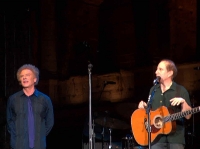
Simon & Garfunkel is an American singer-songwriter duo consisting of Paul Simon and Art Garfunkel. They formed the group Tom & Jerry in 1957, and had their first taste of success with the minor hit "Hey, Schoolgirl". As Simon & Garfunkel, the duo rose to fame in 1965, backed by the hit single "The Sounds of Silence". Their music was featured in the landmark film The Graduate, propelling them further into the public consciousness.
They are well known for their close vocal harmonies and sometimes unstable relationship. Their last album, Bridge over Troubled Water, was delayed several times due to artistic disagreements. They were among the most popular recording artists of the 1960s; among their biggest hits, in addition to "The Sounds of Silence", were "I Am a Rock", "Homeward Bound", "A Hazy Shade of Winter", "Mrs. Robinson", "Bridge over Troubled Water", "The Boxer", "Cecilia", and "Scarborough Fair/Canticle". They have received several Grammys and are inductees of the Rock and Roll Hall of Fame and the Long Island Music Hall of Fame (2007). They have reunited on several occasions since their 1970 breakup, most famously for 1981's The Concert in Central Park, which attracted about 500,000 people.
They are well known for their close vocal harmonies and sometimes unstable relationship. Their last album, Bridge over Troubled Water, was delayed several times due to artistic disagreements. They were among the most popular recording artists of the 1960s; among their biggest hits, in addition to "The Sounds of Silence", were "I Am a Rock", "Homeward Bound", "A Hazy Shade of Winter", "Mrs. Robinson", "Bridge over Troubled Water", "The Boxer", "Cecilia", and "Scarborough Fair/Canticle". They have received several Grammys and are inductees of the Rock and Roll Hall of Fame and the Long Island Music Hall of Fame (2007). They have reunited on several occasions since their 1970 breakup, most famously for 1981's The Concert in Central Park, which attracted about 500,000 people.
Thelonious Monk
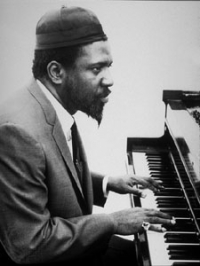
Thelonious Sphere Monk was an American jazz pianist and composer. He had a unique improvisational style and made numerous contributions to the standard jazz repertoire, including "'Round Midnight", "Blue Monk", "Straight, No Chaser", "Ruby, My Dear", "In Walked Bud", and "Well, You Needn't"
Joe sample
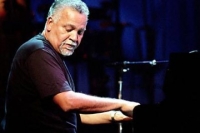
Joseph Leslie Sample was an American pianist, keyboard player, and composer. He was one of the founding members of the Jazz Crusaders, the band which became simply the Crusaders in 1971, and remained a part of the group until its final album in 1991.
Vanessa Carlton
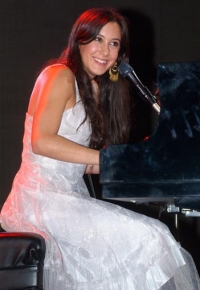
Vanessa Lee Carlton (born August 16, 1980) is an American soft rock/Piano pop singer, songwriter, and pianist best known for the Billboard top five, Grammy-nominated single "A Thousand Miles" from her debut album, Be Not Nobody which was released April 30, 2002, and certified platinum in the U.S.
Her music, along with that of her contemporary Michelle Branch to whom she is sometimes compared, has had an influence on female solo pop singer-songwriters in the 21st century, including Kate Voegele, Lights, Sara Bareilles (another piano pop artist), Colbie Caillat and Tristan Prettyman.
Carlton's second album, Harmonium (released November 9, 2004), debuted at number 33 on the U.S. Billboard 200 and had sold 179,000 copies as of February 2006, with the single "White Houses," peaking at 86 in the U.S. Billboard Hot 100. She subsequently parted company from her record label A&M, though she still holds a dedicated fanbase.
Her third album, Heroes and Thieves, was released on October 9, 2007 by the The Inc./Universal Motown record labels.
Her music, along with that of her contemporary Michelle Branch to whom she is sometimes compared, has had an influence on female solo pop singer-songwriters in the 21st century, including Kate Voegele, Lights, Sara Bareilles (another piano pop artist), Colbie Caillat and Tristan Prettyman.
Carlton's second album, Harmonium (released November 9, 2004), debuted at number 33 on the U.S. Billboard 200 and had sold 179,000 copies as of February 2006, with the single "White Houses," peaking at 86 in the U.S. Billboard Hot 100. She subsequently parted company from her record label A&M, though she still holds a dedicated fanbase.
Her third album, Heroes and Thieves, was released on October 9, 2007 by the The Inc./Universal Motown record labels.
John Francis Wade
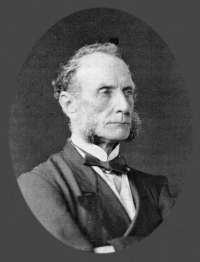
John Francis Wade (1 January 1711 – 16 August 1786) was an English hymnist who is sometimes credited with writing and composing the hymn "Adeste Fideles" (which was later translated to "O Come All Ye Faithful"), even though the actual authorship of the hymn remains uncertain. The earliest copies of the hymn all bear his signature.Born either in England or in Douai, Flanders, France, Wade fled to France after the Jacobite rising of 1745 was crushed. As a Catholic layman, he lived with exiled English Catholics in France, where he taught music and worked on church music for private use.
J. S. Bach
Johann Sebastian Bach (21 March 1685, O.S.31 March 1685, N.S. – 28 July 1750, N.S.) was a German composer, organist, harpsichordist, violist, and violinist whose sacred and secular works for choir, orchestra, and solo instruments drew together the strands of the Baroque period and brought it to its ultimate maturity. Although he did not introduce new forms, he enriched the prevailing German style with a robust contrapuntal technique, an unrivalled control of harmonic and motivic organisation, and the adaptation of rhythms, forms and textures from abroad, particularly from Italy and France.
Revered for their intellectual depth, technical command and artistic beauty, Bach's works include the Brandenburg Concertos, the Goldberg Variations, the Partitas, The Well-Tempered Clavier, the Mass in B minor, the St Matthew Passion, the St John Passion, the Magnificat, A Musical Offering, The Art of Fugue, the English and French Suites, the Sonatas and Partitas for solo violin, the Cello Suites, more than 200 surviving cantatas, and a similar number of organ works, including the famous Toccata and Fugue in D minor and Passacaglia and Fugue in C minor, as well as the Great Eighteen Chorale Preludes and Organ Mass.
Bach's abilities as an organist were highly respected throughout Europe during his lifetime, although he was not widely recognised as a great composer until a revival of interest and performances of his music in the first half of the 19th century. He is now generally regarded as one of the main composers of the Baroque style, and as one of the greatest composers of all time.
Revered for their intellectual depth, technical command and artistic beauty, Bach's works include the Brandenburg Concertos, the Goldberg Variations, the Partitas, The Well-Tempered Clavier, the Mass in B minor, the St Matthew Passion, the St John Passion, the Magnificat, A Musical Offering, The Art of Fugue, the English and French Suites, the Sonatas and Partitas for solo violin, the Cello Suites, more than 200 surviving cantatas, and a similar number of organ works, including the famous Toccata and Fugue in D minor and Passacaglia and Fugue in C minor, as well as the Great Eighteen Chorale Preludes and Organ Mass.
Bach's abilities as an organist were highly respected throughout Europe during his lifetime, although he was not widely recognised as a great composer until a revival of interest and performances of his music in the first half of the 19th century. He is now generally regarded as one of the main composers of the Baroque style, and as one of the greatest composers of all time.
GHINZU
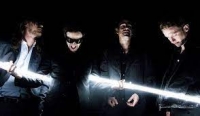
Ghinzu is an alternative rock band founded in 1999 in Brussels, Belgium.The band released its first album, Electronic Jacuzzi in late 2000 on their own label Dragoon. Their sound is a kind of noisy rock, supported by a big and groovy rhythmic and some electronic touches while their subject matters are, among others, sex, partying, and drugs. The album was only released in Belgium and sold enough at least to make another one.
Vasily Solovyov-Sedoi
Vasily Pavlovich Solovyov-Sedoi was a Soviet and Russian classical composer and songwriter who was born and died in Leningrad. Solovyov-Sedoi composed, among others, the music for the songs Solov'i and Moscow Nights. He also wrote music for numerous films.
Gabriel Faure

Gabriel Urbain Fauré (12 May 1845 – 4 November 1924) was a French composer, organist, pianist, and teacher. He was the foremost French composer of his generation, and his musical style influenced many 20th century composers. His harmonic and melodic language affected how harmony was later taught.
Nina Simone
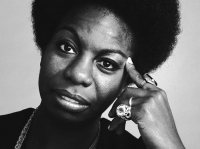
Nina Simone was an American singer, songwriter, pianist, arranger, and civil rights activist who worked in a broad range of musical styles including classical, jazz, blues, folk, R&B, gospel, and pop.
Mariah Carey

Mariah Carey (born March 27, 1970) is an American singer, songwriter, record producer, and actress. She made her recording debut in 1990 under the guidance of Columbia Records executive Tommy Mottola, and became the first recording artist to have her first five singles top the U.S. Billboard Hot 100 chart. Following her marriage to Mottola in 1993, a series of hit records established her position as Columbia's highest-selling act. According to Billboard magazine, she was the most successful artist of the 1990s in the United States.
Following her separation from Mottola in 1997, Carey introduced elements of hip hop into her album work, to much initial success, but her popularity was in decline when she left Columbia in 2001, and she was dropped by Virgin Records the following year after a highly publicized physical and emotional breakdown, as well as the poor reception given to Glitter, her film and soundtrack project. In 2002, Carey signed with Island Records, and after a relatively unsuccessful period, she returned to pop music in 2005.
Carey was named the best-selling female pop artist of the millennium at the 2000 World Music Awards. She has had the most number-one singles for a solo artist in the United States (eighteen; second artist overall behind The Beatles), where, according to the Recording Industry Association of America, she is the third best-selling female and sixteenth overall recording artist. In addition to her commercial accomplishments, Carey has earned five Grammy Awards, and is well-known for her vocal range, power, melismatic style, and use of the whistle register.
Following her separation from Mottola in 1997, Carey introduced elements of hip hop into her album work, to much initial success, but her popularity was in decline when she left Columbia in 2001, and she was dropped by Virgin Records the following year after a highly publicized physical and emotional breakdown, as well as the poor reception given to Glitter, her film and soundtrack project. In 2002, Carey signed with Island Records, and after a relatively unsuccessful period, she returned to pop music in 2005.
Carey was named the best-selling female pop artist of the millennium at the 2000 World Music Awards. She has had the most number-one singles for a solo artist in the United States (eighteen; second artist overall behind The Beatles), where, according to the Recording Industry Association of America, she is the third best-selling female and sixteenth overall recording artist. In addition to her commercial accomplishments, Carey has earned five Grammy Awards, and is well-known for her vocal range, power, melismatic style, and use of the whistle register.
Gioachino Antonio Rossini
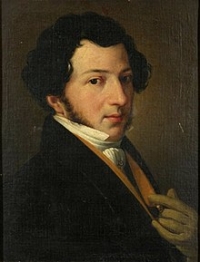
Gioachino Antonio Rossini (29 February 1792 – 13 November 1868) was an Italian composer who gained fame for his 39 operas, although he also wrote many songs, some chamber music and piano pieces, and some sacred music. He set new standards for both comic and serious opera before retiring from large-scale composition while still in his thirties, at the height of his popularity.
Born in Pesaro to parents who were both musicians (his father a trumpeter, his mother a singer), Rossini began to compose by the age of 12 and was educated at music school in Bologna. His first opera was performed in Venice in 1810 when he was 18 years old. In 1815 he was engaged to write operas and manage theatres in Naples. In the period 1810–1823 he wrote 34 operas for the Italian stage that were performed in Venice, Milan, Ferrara, Naples and elsewhere; this productivity necessitated an almost formulaic approach for some components (such as overtures) and a certain amount of self-borrowing. During this period he produced his most popular works including the comic operas L'italiana in Algeri, Il barbiere di Siviglia (known in English as The Barber of Seville) and La Cenerentola, which brought to a peak the opera buffa tradition he inherited from masters such as Domenico Cimarosa. He also composed opera seria works such as Otello, Tancredi and Semiramide. All of these attracted admiration for their innovation in melody, harmonic and instrumental colour, and dramatic form. In 1824 he was contracted by the Opéra in Paris, for which he produced an opera to celebrate the coronation of Charles X, Il viaggio a Reims (later cannibalised for his first opera in French, Le comte Ory), revisions of two of his Italian operas, Le siège de Corinthe and Moïse, and in 1829 his last opera, Guillaume Tell.
Born in Pesaro to parents who were both musicians (his father a trumpeter, his mother a singer), Rossini began to compose by the age of 12 and was educated at music school in Bologna. His first opera was performed in Venice in 1810 when he was 18 years old. In 1815 he was engaged to write operas and manage theatres in Naples. In the period 1810–1823 he wrote 34 operas for the Italian stage that were performed in Venice, Milan, Ferrara, Naples and elsewhere; this productivity necessitated an almost formulaic approach for some components (such as overtures) and a certain amount of self-borrowing. During this period he produced his most popular works including the comic operas L'italiana in Algeri, Il barbiere di Siviglia (known in English as The Barber of Seville) and La Cenerentola, which brought to a peak the opera buffa tradition he inherited from masters such as Domenico Cimarosa. He also composed opera seria works such as Otello, Tancredi and Semiramide. All of these attracted admiration for their innovation in melody, harmonic and instrumental colour, and dramatic form. In 1824 he was contracted by the Opéra in Paris, for which he produced an opera to celebrate the coronation of Charles X, Il viaggio a Reims (later cannibalised for his first opera in French, Le comte Ory), revisions of two of his Italian operas, Le siège de Corinthe and Moïse, and in 1829 his last opera, Guillaume Tell.
Chantal Kreviazuk
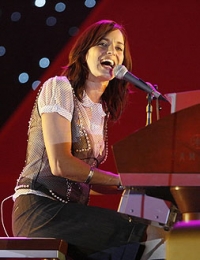
Chantal Kreviazuk (born May 18, 1974) is a Canadian singer-songwriter of the Adult contemporary music genre. She is also a classically trained pianist, and can play the guitar. She is of Ukrainian descent.
Kreviazuk's work has appeared on many soundtracks for films and television shows. In 1998, Kreviazuk scored her only international hit to date with a cover of "Leaving on a Jet Plane", a song written by John Denver and popularized by Peter, Paul & Mary. The song appeared on the soundtrack to the blockbuster film Armageddon and was that album's follow-up single to Aerosmith's "I Don't Want to Miss a Thing."
In 1999, Chantal recorded a cover of the Randy Newman ballad "Feels Like Home" for the Dawson's Creek soundtrack, as well as "How to Lose a Guy in Ten Days," and performed a cover version of The Beatles' "In My Life" for the television drama Providence.
Kreviazuk's work has appeared on many soundtracks for films and television shows. In 1998, Kreviazuk scored her only international hit to date with a cover of "Leaving on a Jet Plane", a song written by John Denver and popularized by Peter, Paul & Mary. The song appeared on the soundtrack to the blockbuster film Armageddon and was that album's follow-up single to Aerosmith's "I Don't Want to Miss a Thing."
In 1999, Chantal recorded a cover of the Randy Newman ballad "Feels Like Home" for the Dawson's Creek soundtrack, as well as "How to Lose a Guy in Ten Days," and performed a cover version of The Beatles' "In My Life" for the television drama Providence.
Tom Fettke
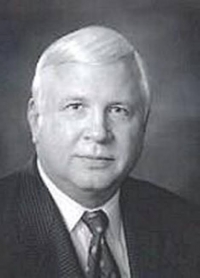
Tom Fettke is a composer, arranger and producer of music and recordings for the church and school. His published works and recordings number in the hundreds. His classic choral work THE MAJESTY AND GLORY OF YOUR NAME is sung by thousands of church and school choirs around the world.
Marvin Hamlisch
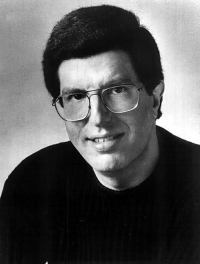
Marvin Frederick Hamlisch (June 2, 1944 – August 6, 2012) was an American composer and conductor. Hamlisch was one of only sixteen people to win Emmy, Grammy, Oscar and Tony awards. This collection of all four is referred to as an "EGOT". He is one of only two people (along with composer Richard Rodgers) to have won those four prizes and a Pulitzer Prize ("PEGOT").
Paolo Ugoletti
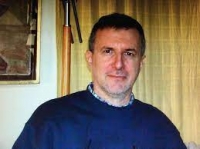
Paolo Ugoletti (born 7 June 1956) is an Italian composer. Paolo Ugoletti was born in Brescia on 7 June 1956. He studied composition since 1973 at the Conservatory of Brescia with Giancarlo Facchinetti and Giovanni Ugolini and then at the Conservatory "Giuseppe Verdi" in Milan with Giacomo Manzoni. From 1977 to 1979 he attended Franco Donatoni's composition course at the Accademia Musicale Chigiana in Siena where he obtains the diploma of merit.
Carlos Careqa
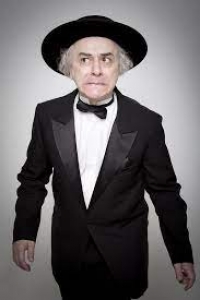
A promising artist who has been militating in the vanguard of the Brazilian pop, Carlos Careqa has had his songs recorded by Rita Ribeiro and Vânia Abreu, among others. In São Paulo, he wrote several soundtracks for plays and films, along with his musical performances in the city's nightclubs. In the '90s, he also performed in Genève and Berlin. Careqa had his first album, Os Homens São Todos Iguais, released in 1993, with "Acho" receiving good airing in São Paulo. Música Para Final de Século (1999) had "Ser Igual É Legal" included in the soundtrack of a prime time soap opera.
No Doubt
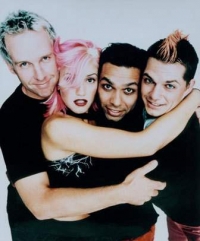
No Doubt is a rock band from Anaheim, California, United States, founded in 1986. The ska-rock sound of its first album failed to make waves due to the popularity of the grunge movement at the time. The band's diamond-certified album Tragic Kingdom helped to launch the ska revival of the 1990s, and "Don't Speak", the third single from the album, set a record when it spent sixteen weeks at the number one spot on the Billboard Hot 100 Airplay chart, later broken by the Goo Goo Dolls' "Iris".
The group released its next album, Return of Saturn, four years later, but despite positive reviews, the album was considered a commercial failure. Fifteen months later, the band reappeared with Rock Steady, which incorporated reggae and dancehall music into their work. The album was primarily recorded in Jamaica and featured collaborations with Jamaican artists Bounty Killer, Sly and Robbie, and Lady Saw. The album produced two Grammy-winning singles, "Hey Baby" and "Underneath It All".
No Doubt released the compilation The Singles 1992-2003 and box set Boom Box in 2003, both of which contained a cover version of the Talk Talk synthpop song "It's My Life". Frontwoman Gwen Stefani launched her solo career the next year with several collaborations, including bandmate Tony Kanal and Neptune Pharrell, while guitarist Tom Dumont began his side project, Invincible Overlord. During its career, the band has won two Grammy Awards and sold 27 million records worldwide to date.
The group released its next album, Return of Saturn, four years later, but despite positive reviews, the album was considered a commercial failure. Fifteen months later, the band reappeared with Rock Steady, which incorporated reggae and dancehall music into their work. The album was primarily recorded in Jamaica and featured collaborations with Jamaican artists Bounty Killer, Sly and Robbie, and Lady Saw. The album produced two Grammy-winning singles, "Hey Baby" and "Underneath It All".
No Doubt released the compilation The Singles 1992-2003 and box set Boom Box in 2003, both of which contained a cover version of the Talk Talk synthpop song "It's My Life". Frontwoman Gwen Stefani launched her solo career the next year with several collaborations, including bandmate Tony Kanal and Neptune Pharrell, while guitarist Tom Dumont began his side project, Invincible Overlord. During its career, the band has won two Grammy Awards and sold 27 million records worldwide to date.
James Morrison

James Morrison (born 13 August 1984) is an English singer, songwriter, and guitarist born in Rugby. He now lives in Brighton.
In 2006, he debuted with the single "You Give Me Something" which became a huge hit around Europe, Australia, and Japan, charting at #5 in the UK and #1 in New Zealand His debut album, Undiscovered, went straight to number one in the UK and has sold more than three million copies worldwide.
Morrison performed at the Concert for Diana on July 1, 2007. He performed the songs "Wonderful World" and "You Give Me Something" in honour of Princess Diana.
In 2006, he debuted with the single "You Give Me Something" which became a huge hit around Europe, Australia, and Japan, charting at #5 in the UK and #1 in New Zealand His debut album, Undiscovered, went straight to number one in the UK and has sold more than three million copies worldwide.
Morrison performed at the Concert for Diana on July 1, 2007. He performed the songs "Wonderful World" and "You Give Me Something" in honour of Princess Diana.
Isaac Shepard

Growing up in a musical family, Isaac Shepard began playing piano/keyboards by ear at the age of twelve and very soon thereafter joined the band his father, James, was singing and playing guitar in at the time. As a member of “Dave and the Reverbs,” Isaac played keyboards at various soup kitchens, homeless shelters, social gatherings, church events, and random venues throughout Southern California.
Within a few years, Isaac’s family (father James, mother Debra, and brother Elijah) joined together to form a family band they named “Four Shepards and a Lamb,” and in 1996 they produced a self-titled CD of original contemporary Christian music. In 1998, Isaac released his first solo album, “On Subtle Ground,” featuring original keyboard instrumentals. Over the years, Isaac has played piano for numerous church worship teams and has continued to collaborate with James, adding piano to the rock “Moment By Moment” CD and to the Beatles/Everly Brothers love-songs tribute album called “From Me To You.” In 2005, Isaac produced his first live piano album, “Swept Away,” a collection of relaxing compositions. In 2008, Isaac produced his second solo piano album, called “Deep Joy.”
Within a few years, Isaac’s family (father James, mother Debra, and brother Elijah) joined together to form a family band they named “Four Shepards and a Lamb,” and in 1996 they produced a self-titled CD of original contemporary Christian music. In 1998, Isaac released his first solo album, “On Subtle Ground,” featuring original keyboard instrumentals. Over the years, Isaac has played piano for numerous church worship teams and has continued to collaborate with James, adding piano to the rock “Moment By Moment” CD and to the Beatles/Everly Brothers love-songs tribute album called “From Me To You.” In 2005, Isaac produced his first live piano album, “Swept Away,” a collection of relaxing compositions. In 2008, Isaac produced his second solo piano album, called “Deep Joy.”
Handel

George Frideric Handel (Friday, 23 February 1685 - Saturday, 14 April 1759) was a German-born Baroque composer who is famous for his operas, oratorios and concerti grossi. Born as Georg Friedrich Handel in Halle, he spent most of his adult life in England, becoming a subject of the British crown on 22 January 1727. His most famous works are Messiah, an oratorio set to texts from the King James Bible; Water Music; and Music for the Royal Fireworks. Strongly influenced by the techniques of the great composers of the Italian Baroque and the English composer Henry Purcell, his music was known to many significant composers who came after him, including Haydn, Mozart, and Beethoven.
Handel's compositions include 42 operas; 29 oratorios; more than 120 cantatas, trios and duets; numerous arias; chamber music; a large number of ecumenical pieces; odes and serenatas; and sixteen organ concerti. His most famous work, the Messiah oratorio with its "Hallelujah" chorus, is among the most popular works in choral music and has become a centerpiece of the Christmas season. Also popular are the Opus 3 and 6 Concerti Grossi, as well as "The Cuckoo and the Nightingale", in which birds are heard calling during passages played in different keys representing the vocal ranges of two birds. Also notable are his sixteen keyboard suites, especially The Harmonious Blacksmith.
Handel introduced various previously uncommon musical instruments in his works: the viola d'amore and violetta marina (Orlando), the lute (Ode for St. Cecilia's Day), three trombones (Saul), clarinets or small high cornets (Tamerlano), theorbo, French horn (Water Music), lyrichord, double bassoon, viola da gamba, bell chimes, positive organ, and harp (Giulio Cesare, Alexander's Feast).
Handel's compositions include 42 operas; 29 oratorios; more than 120 cantatas, trios and duets; numerous arias; chamber music; a large number of ecumenical pieces; odes and serenatas; and sixteen organ concerti. His most famous work, the Messiah oratorio with its "Hallelujah" chorus, is among the most popular works in choral music and has become a centerpiece of the Christmas season. Also popular are the Opus 3 and 6 Concerti Grossi, as well as "The Cuckoo and the Nightingale", in which birds are heard calling during passages played in different keys representing the vocal ranges of two birds. Also notable are his sixteen keyboard suites, especially The Harmonious Blacksmith.
Handel introduced various previously uncommon musical instruments in his works: the viola d'amore and violetta marina (Orlando), the lute (Ode for St. Cecilia's Day), three trombones (Saul), clarinets or small high cornets (Tamerlano), theorbo, French horn (Water Music), lyrichord, double bassoon, viola da gamba, bell chimes, positive organ, and harp (Giulio Cesare, Alexander's Feast).
Jay Chou
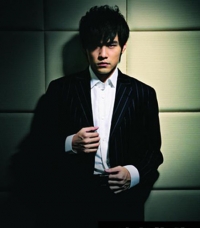
Jay Chou (traditional Chinese: 周杰倫; simplified Chinese: 周杰伦; pinyin: Zhōu Jiélún; Wade-Giles: Chou Chieh-lun; Pe̍h-ōe-jī: Chiu Kia̍t-lûn) (born January 18, 1979) is a Taiwanese musician, singer, producer, actor and director who has won the World Music Award four times. He is well-known for composing all his own songs and songs for other singers. In 1998 he was discovered in a talent contest where he displayed his piano and song-writing skills. Over the next two years, he was hired to compose for popular Chinese singers. Although he was trained in classical music, Chou combines Chinese and Western music styles to produce songs that fuse R&B, rock and pop genres, covering issues such as domestic violence, war, and urbanization.
In 2000 Chou released his first album, titled Jay, under the record company Alfa Music. Since then he has released one album per year, selling several million copies each. His music has gained recognition throughout Asia, most notably in regions such as Taiwan, China, Hong Kong, Japan, Malaysia, Indonesia, Singapore, Thailand, Vietnam and in overseas Asian communities, winning more than 20 awards each year. He has sold over 25 million albums worldwide. He debuted his acting career in Initial D (2005), for which he won Best Newcomer Actor in Golden Horse Awards, and was nominated for Best Supporting Actor by Hong Kong Film Awards for his role in Curse of the Golden Flower (2006). His career now extends into directing and running his own record company JVR Music. He has also endorsed various models of Media Players released by Onda in which he appears on the box, and his signature and likeness is printed on the back of certain models of these players.
In 2000 Chou released his first album, titled Jay, under the record company Alfa Music. Since then he has released one album per year, selling several million copies each. His music has gained recognition throughout Asia, most notably in regions such as Taiwan, China, Hong Kong, Japan, Malaysia, Indonesia, Singapore, Thailand, Vietnam and in overseas Asian communities, winning more than 20 awards each year. He has sold over 25 million albums worldwide. He debuted his acting career in Initial D (2005), for which he won Best Newcomer Actor in Golden Horse Awards, and was nominated for Best Supporting Actor by Hong Kong Film Awards for his role in Curse of the Golden Flower (2006). His career now extends into directing and running his own record company JVR Music. He has also endorsed various models of Media Players released by Onda in which he appears on the box, and his signature and likeness is printed on the back of certain models of these players.
György Ligeti
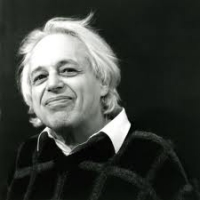
György Sándor Ligeti (May 28, 1923 – June 12, 2006) was a composer, born in a Hungarian Jewish family in Transylvania, Romania. He briefly lived in Hungary before later becoming an Austrian citizen. Many of his works are well known in classical music circles, but to the general public, he is best-known for the various pieces featured in the Stanley Kubrick films 2001: A Space Odyssey, The Shining, and Eyes Wide Shut.
Ligeti's music is best-known to the general public for its use in the films of Stanley Kubrick. The soundtrack to 2001: A Space Odyssey includes four of his pieces: Atmosphères, Lux Aeterna (for the moon-bus scene en route to the TMA-1 monolith in the crater Tycho), Requiem (the Kyrie section), and an electronically altered version of Aventures (in the cryptic final scenes). Some of this music was used again in Peter Hyams's 1984 sequel film, 2010. Kubrick's The Shining uses Lontano for orchestra. The second of Ligeti's Musica ricercata is used extensively in Eyes Wide Shut.
Ligeti's music is best-known to the general public for its use in the films of Stanley Kubrick. The soundtrack to 2001: A Space Odyssey includes four of his pieces: Atmosphères, Lux Aeterna (for the moon-bus scene en route to the TMA-1 monolith in the crater Tycho), Requiem (the Kyrie section), and an electronically altered version of Aventures (in the cryptic final scenes). Some of this music was used again in Peter Hyams's 1984 sequel film, 2010. Kubrick's The Shining uses Lontano for orchestra. The second of Ligeti's Musica ricercata is used extensively in Eyes Wide Shut.
Chico Buarque
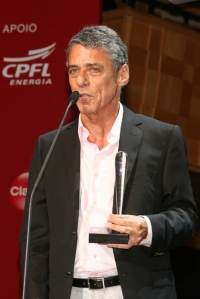
Francisco Buarque de Hollanda, popularly known simply as Chico Buarque, is a Brazilian singer-songwriter, guitarist, composer, playwright, writer, and poet. He is best known for his music, which often includes social, economic, and cultural reflections on Brazil.
Jean-Philippe Rameau
Jean-Philippe Rameau is a well-known French composer and music theorist of baroque music in Europe. Jean-Baptiste Lully took his place in French opera and was the most important French composer who composed music for the French harpsichord Couperin and harpsichord.
Anne Ku

A native of Taiwan, faculty member Anne Ku is an orchestral and chamber musician, as well as an established teacher in the Princeton area. A graduate of The Juilliard School, her goal in music is to inspire the next generation of classical musicians.
10cc

10cc are an English art rock band who achieved their greatest commercial success in the 1970s. Initially comprising four musicians — Graham Gouldman, Eric Stewart, Kevin Godley and Lol Creme — who had written and recorded together for some three years, before assuming the “10cc” name in 1972.
Two strong song-writing teams, a commercial team and an artistic team, injected sharp wit to lyrically-dextrous songs. The commercial team (Stewart and Gouldman) were straight pop-song-writers, who created the band’s most accessible songs; the artistic team (Godley and Creme) were the experimental half of 10cc, featuring an Art School sensibility and cinematic writing. Each man was a multi-instrumentalist, singer, writer, and producer, and each could perform as the lead singer.
Two strong song-writing teams, a commercial team and an artistic team, injected sharp wit to lyrically-dextrous songs. The commercial team (Stewart and Gouldman) were straight pop-song-writers, who created the band’s most accessible songs; the artistic team (Godley and Creme) were the experimental half of 10cc, featuring an Art School sensibility and cinematic writing. Each man was a multi-instrumentalist, singer, writer, and producer, and each could perform as the lead singer.
Schumann

Robert Schumann, sometimes given as Robert Alexander Schumann, (June 8, 1810 – July 29, 1856) was a German composer, aesthete and influential music critic. He is one of the most famous Romantic composers of the 19th century.
He had hoped to pursue a career as a virtuoso pianist, having been assured by his teacher Friedrich Wieck that he could become the finest pianist in Europe after only a few years of study with him. However, a hand injury prevented those hopes from being realized, and he decided to focus his musical energies on composition. Schumann's published compositions were, until 1840, all for the piano; he later composed works for piano and orchestra, many lieder (songs for voice and piano), four symphonies, an opera, and other orchestral, choral and chamber works. His writings about music appeared mostly in the Neue Zeitschrift für Musik ("The New Journal for Music"), a Leipzig-based publication that he jointly founded.
In 1840, after a long and acrimonious legal battle with his piano instructor Friedrich Wieck, Schumann married Wieck's daughter, pianist Clara Wieck, a considerable figure of the Romantic period in her own right. Clara Wieck showcased many works by her husband as well. For the last two years of his life, after an attempted suicide, Schumann was confined to a mental institution.
He had hoped to pursue a career as a virtuoso pianist, having been assured by his teacher Friedrich Wieck that he could become the finest pianist in Europe after only a few years of study with him. However, a hand injury prevented those hopes from being realized, and he decided to focus his musical energies on composition. Schumann's published compositions were, until 1840, all for the piano; he later composed works for piano and orchestra, many lieder (songs for voice and piano), four symphonies, an opera, and other orchestral, choral and chamber works. His writings about music appeared mostly in the Neue Zeitschrift für Musik ("The New Journal for Music"), a Leipzig-based publication that he jointly founded.
In 1840, after a long and acrimonious legal battle with his piano instructor Friedrich Wieck, Schumann married Wieck's daughter, pianist Clara Wieck, a considerable figure of the Romantic period in her own right. Clara Wieck showcased many works by her husband as well. For the last two years of his life, after an attempted suicide, Schumann was confined to a mental institution.
Cat Stevens
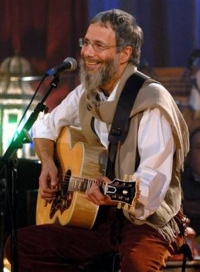
Yusuf Islam, (born Steven Demetre Georgiou on 21 July 1948), best known by his former stage name Cat Stevens, is a British musician of Greek Cypriot and Swedish ancestry. He is a singer-songwriter, multi-instrumentalist, educator, philanthropist and prominent convert to Islam.
As Cat Stevens, he sold over 60 million albums around the world since the late 1960s. His albums Tea for the Tillerman and Teaser and the Firecat were both certified as Triple Platinum by the RIAA in the United States (three million sales each); his album Catch Bull at Four sold half a million copies in the first two weeks of release alone, and was Billboard's number-one LP for three consecutive weeks. His songwriting has also earned him two ASCAP songwriting awards for "The First Cut Is the Deepest," which has been a hit single for five different artists, and has been instrumental for others in establishing their musical careers.
Stevens converted to Islam at the height of his fame in 1977. The following year, he adopted his Muslim name Yusuf Islam, sold all his instruments and awards for charity, and left his music career to devote himself to educational and philanthropic causes in the Muslim community. He turned to his mother to help him decide the best candidate to wed, and thus, in an arranged marriage, took his vows with Fauzia Mubarak Ali, eventually producing five living children from the union.
He has been given several awards for his work in promoting peace in the world, including 2003's World Award, the 2004 Man for Peace award, and the 2007 Mediterranean Prize for Peace. In 2006, he returned to pop music, with his first album of new pop songs in 28 years, entitled An Other Cup.
He lives with his wife, children and grand-child in London. Yusuf Islam spends part of each year in Dubai.
As Cat Stevens, he sold over 60 million albums around the world since the late 1960s. His albums Tea for the Tillerman and Teaser and the Firecat were both certified as Triple Platinum by the RIAA in the United States (three million sales each); his album Catch Bull at Four sold half a million copies in the first two weeks of release alone, and was Billboard's number-one LP for three consecutive weeks. His songwriting has also earned him two ASCAP songwriting awards for "The First Cut Is the Deepest," which has been a hit single for five different artists, and has been instrumental for others in establishing their musical careers.
Stevens converted to Islam at the height of his fame in 1977. The following year, he adopted his Muslim name Yusuf Islam, sold all his instruments and awards for charity, and left his music career to devote himself to educational and philanthropic causes in the Muslim community. He turned to his mother to help him decide the best candidate to wed, and thus, in an arranged marriage, took his vows with Fauzia Mubarak Ali, eventually producing five living children from the union.
He has been given several awards for his work in promoting peace in the world, including 2003's World Award, the 2004 Man for Peace award, and the 2007 Mediterranean Prize for Peace. In 2006, he returned to pop music, with his first album of new pop songs in 28 years, entitled An Other Cup.
He lives with his wife, children and grand-child in London. Yusuf Islam spends part of each year in Dubai.
Rossini

Gioachino Antonio Rossini (February 29, 1792 – November 13, 1868) was a popular Italian composer who created 39 operas as well as sacred music and chamber music. His best known works include Il barbiere di Siviglia (The Barber of Seville), La Cenerentola and Guillaume Tell (William Tell).
Rossini's most famous opera was produced on February 20, 1816 at the Teatro Argentina in Rome. The libretto by Cesare Sterbini, a version of Pierre Beaumarchais' infamous stage play Le Barbier de Séville, was the same as that already used by Giovanni Paisiello in his own Barbiere, an opera which had enjoyed European popularity for more than a quarter of a century. Much is made of how fast Rossini's opera was written, scholarship generally agreeing upon two weeks. Later in life, Rossini claimed to have written the opera in only twelve days. It was a colossal failure when it premiered as Almaviva; Paisiello’s admirers were extremely indignant, sabotaging the production by whistling and shouting during the entire first act. However, not long after the second performance, the opera became so successful that the fame of Paisiello's opera was transferred to Rossini's, to which the title The Barber of Seville passed as an inalienable heritage.
Rossini's most famous opera was produced on February 20, 1816 at the Teatro Argentina in Rome. The libretto by Cesare Sterbini, a version of Pierre Beaumarchais' infamous stage play Le Barbier de Séville, was the same as that already used by Giovanni Paisiello in his own Barbiere, an opera which had enjoyed European popularity for more than a quarter of a century. Much is made of how fast Rossini's opera was written, scholarship generally agreeing upon two weeks. Later in life, Rossini claimed to have written the opera in only twelve days. It was a colossal failure when it premiered as Almaviva; Paisiello’s admirers were extremely indignant, sabotaging the production by whistling and shouting during the entire first act. However, not long after the second performance, the opera became so successful that the fame of Paisiello's opera was transferred to Rossini's, to which the title The Barber of Seville passed as an inalienable heritage.
The Supremes
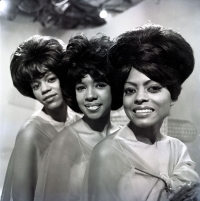
The Supremes were an American female singing group and a premier act of Motown Records during the 1960s. Founded as The Primettes in Detroit, Michigan, in 1959, the Supremes were the most commercially successful of Motown's acts and are, to date, America's most successful vocal group with 12 number one singles on the Billboard Hot 100. Most of these hits were written and produced by Motown's main songwriting and production team, Holland–Dozier–Holland. At their peak in the mid-1960s, the Supremes rivaled the Beatles in worldwide popularity, and it is said that their success made it possible for future African American R&B and soul musicians to find mainstream success.
Scott Alan

cott Alan is an American songwriter who has released eight albums, beginning with his debut album Dreaming Wide Awake.[2
Olivier Messiaen
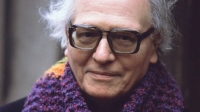
Olivier Eugène Prosper Charles Messiaen was a French composer, organist, and ornithologist, one of the major composers of the 20th century
Simeon Ten Holt
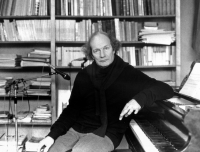
Simeon ten Holt was a Dutch contemporary classical composer. Ten Holt was born in Bergen, North Holland, and studied with Jakob van Domselaer, eventually developing a highly personal style of minimal composition.
Van Morrison
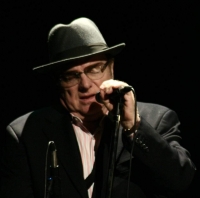
George Ivan Morrison OBE (generally known as Van Morrison) (born 31 August 1945) is a Grammy Award-winning Northern Irish singer, songwriter, author, poet and multi-instrumentalist, who has been a professional musician since the late 1950s. He plays a variety of instruments, including the guitar, harmonica, keyboards, drums, and saxophone. Featuring his characteristic growl—a unique mix of folk, blues, soul, jazz, gospel, and Ulster Scots Celtic influences—Morrison is widely considered one of the most unusual and influential vocalists in the history of rock and roll. Critic Greil Marcus has gone so far as to say that "no white man sings like Van Morrison."
Known as "Van the Man" by his fans, Morrison first rose to prominence as the lead singer of the Northern Irish band Them, writing their 1964 garage rock classic hit, "Gloria". A few years later, Morrison left the band and embarked on a successful solo career.
Morrison has pursued an idiosyncratic musical path. Much of his music is tightly structured around the conventions of American soul and R&B, such as the popular singles, "Brown Eyed Girl", "Moondance", "Domino" and "Wild Night". An equal part of his catalogue consists of lengthy, loosely connected, spiritually inspired musical journeys that show the influence of Celtic tradition, jazz, and stream-of-consciousness narrative, such as his classic album Astral Weeks and lesser known works such as Veedon Fleece and Common One. The two strains together are sometimes referred to as "Celtic Soul".
Morrison's career, spanning some five decades, has influenced many popular musical artists. He was inducted into the Rock and Roll Hall of Fame in 1993 and the Songwriters Hall of Fame in 2003. In 2000, Morrison ranked number twenty-fifth on American cable music channel VH1's list of its "100 Greatest Artists of Rock and Roll", and in 2004, Rolling Stone magazine ranked Van Morrison forty-second on their list of "Greatest Artists of All Time". Paste ranked him twentieth in their list of "100 Greatest Living Songwriters" in 2006 and Q ranked him twenty-second on their list of "100 Greatest Singers" in April 2007.
Known as "Van the Man" by his fans, Morrison first rose to prominence as the lead singer of the Northern Irish band Them, writing their 1964 garage rock classic hit, "Gloria". A few years later, Morrison left the band and embarked on a successful solo career.
Morrison has pursued an idiosyncratic musical path. Much of his music is tightly structured around the conventions of American soul and R&B, such as the popular singles, "Brown Eyed Girl", "Moondance", "Domino" and "Wild Night". An equal part of his catalogue consists of lengthy, loosely connected, spiritually inspired musical journeys that show the influence of Celtic tradition, jazz, and stream-of-consciousness narrative, such as his classic album Astral Weeks and lesser known works such as Veedon Fleece and Common One. The two strains together are sometimes referred to as "Celtic Soul".
Morrison's career, spanning some five decades, has influenced many popular musical artists. He was inducted into the Rock and Roll Hall of Fame in 1993 and the Songwriters Hall of Fame in 2003. In 2000, Morrison ranked number twenty-fifth on American cable music channel VH1's list of its "100 Greatest Artists of Rock and Roll", and in 2004, Rolling Stone magazine ranked Van Morrison forty-second on their list of "Greatest Artists of All Time". Paste ranked him twentieth in their list of "100 Greatest Living Songwriters" in 2006 and Q ranked him twenty-second on their list of "100 Greatest Singers" in April 2007.
Dreamgirls
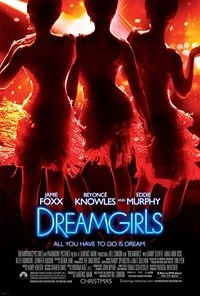
Dreamgirls is a 2006 American musical film, directed by Bill Condon and jointly produced and released by DreamWorks Pictures and Paramount Pictures. The film debuted in three special road show engagements beginning December 15, 2006, with a nationwide release on December 25, 2006 and a home video release on May 1, 2007. Dreamgirls won three awards at the 64th Golden Globe Awards ceremony in 2007, including Best Picture - Musical or Comedy, and won two Oscars at the 79th Academy Awards.
A period piece set in the 1960s and 1970s with a primarily African-American cast, Dreamgirls is adapted from the 1981 Broadway musical of the same name. The musical was based on the history and evolution of American R&B music during the eras of doo-wop, soul, the Motown Sound, funk, and disco. In addition, the stage musical contains several allusions to the lives and careers of Motown Records act The Supremes, a connection the film version expands upon. Dreamgirls follows the lives of Effie White, Deena Jones, and Lorrell Robinson, three young women who form an R&B singing trio from Detroit, Michigan called "The Dreamettes". Thanks to manipulative agent and record executive Curtis Taylor, Jr., the Dreamettes become famous as the backing group for soul singer James "Thunder" Early. Conflict arises when Curtis transforms "The Dreamettes" into the pop-friendly "Dreams," particularly when he has Deena replace Effie as both lead singer of the group and as his romantic interest.
The film adaptation of Dreamgirls stars Jamie Foxx, Beyoncé Knowles, Eddie Murphy, and Jennifer Hudson, who won the 2007 Academy Award for Best Supporting Actress for her portrayal of Effie White. The film also features Danny Glover, Anika Noni Rose, Keith Robinson, Sharon Leal, and Hinton Battle. Produced by Laurence Mark, Dreamgirls was adapted for the screen by director Bill Condon from the original Broadway book by Tom Eyen and the Broadway songs by Eyen and Henry Krieger. Four new songs, composed by Krieger with various lyricists, were added for this film.
A period piece set in the 1960s and 1970s with a primarily African-American cast, Dreamgirls is adapted from the 1981 Broadway musical of the same name. The musical was based on the history and evolution of American R&B music during the eras of doo-wop, soul, the Motown Sound, funk, and disco. In addition, the stage musical contains several allusions to the lives and careers of Motown Records act The Supremes, a connection the film version expands upon. Dreamgirls follows the lives of Effie White, Deena Jones, and Lorrell Robinson, three young women who form an R&B singing trio from Detroit, Michigan called "The Dreamettes". Thanks to manipulative agent and record executive Curtis Taylor, Jr., the Dreamettes become famous as the backing group for soul singer James "Thunder" Early. Conflict arises when Curtis transforms "The Dreamettes" into the pop-friendly "Dreams," particularly when he has Deena replace Effie as both lead singer of the group and as his romantic interest.
The film adaptation of Dreamgirls stars Jamie Foxx, Beyoncé Knowles, Eddie Murphy, and Jennifer Hudson, who won the 2007 Academy Award for Best Supporting Actress for her portrayal of Effie White. The film also features Danny Glover, Anika Noni Rose, Keith Robinson, Sharon Leal, and Hinton Battle. Produced by Laurence Mark, Dreamgirls was adapted for the screen by director Bill Condon from the original Broadway book by Tom Eyen and the Broadway songs by Eyen and Henry Krieger. Four new songs, composed by Krieger with various lyricists, were added for this film.
Aida

Aida is a musical drama in two acts based on Giuseppe Verdi's Italian-language opera by the same name, which is based on a story by Auguste Mariette which is based on Shakespeare's Romeo and Juliet. The musical was produced by Hyperion Theatricals, a unit within Disney Theatrical, with music by Elton John, lyrics by Tim Rice, and book by Linda Woolverton, Robert Falls, and David Henry Hwang.
Elaborate Lives: The Legend of Aida had its world premiere at the Alliance Theatre in Atlanta, Georgia with the production running from September 16 to November 8, 1998. A new, revised production opened on November 12, 1999 at the Cadillac Palace in Chicago. The Broadway production, titled Elton John and Tim Rice's Aida, ran at the Palace Theatre from March 23, 2000 to September 4, 2004 for a total of 1,852 performances (and 30 previews). There was also produced a national tour and several international productions. Aida has recently become popular among school and community theaters. Licensing of these amateur productions of Aida is through Music Theatre International.
Elaborate Lives: The Legend of Aida had its world premiere at the Alliance Theatre in Atlanta, Georgia with the production running from September 16 to November 8, 1998. A new, revised production opened on November 12, 1999 at the Cadillac Palace in Chicago. The Broadway production, titled Elton John and Tim Rice's Aida, ran at the Palace Theatre from March 23, 2000 to September 4, 2004 for a total of 1,852 performances (and 30 previews). There was also produced a national tour and several international productions. Aida has recently become popular among school and community theaters. Licensing of these amateur productions of Aida is through Music Theatre International.
Crusaders
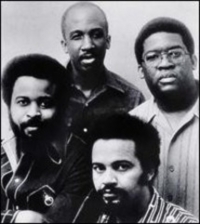
The Crusaders were an American jazz fusion group that was successful from the 1960s to the 1980s. The group was known as the Jazz Crusaders from its formation in 1960 until shortening its name in 1971.High school friends Joe Sample (piano), Wilton Felder (tenor saxophone) and Nesbert "Stix" Hooper (drums) formed their first band together, the Swingsters, in Houston, Texas in 1954. They played a mixture of jazz and R&B, and were joined by Wayne Henderson (trombone), Hubert Laws (flute), and Henry Wilson (bass). The group soon turned more to hard bop, and renamed themselves the Modern Jazz Sextet, but also recorded in a more R&B vein as the Nighthawks (or Nite Hawks).
Bill Evans
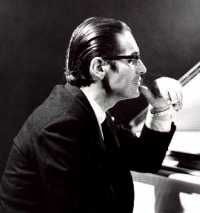
William John Evans, known as Bill Evans (August 16, 1929 – September 15, 1980) was an American jazz pianist. His use of impressionist harmony, inventive interpretation of traditional jazz repertoire, and trademark rhythmically independent, "singing" melodic lines influenced a generation of pianists, including Chick Corea, Herbie Hancock, John Taylor, Steve Kuhn, Don Friedman, Denny Zeitlin, Bobo Stenson and Keith Jarrett, as well as guitarists Lenny Breau and Pat Metheny. The music of Bill Evans continues to inspire younger pianists like Marcin Wasilewski, Fred Hersch, Ray Reach, Bill Charlap, Lyle Mays, Eliane Elias and arguably Brad Mehldau, early in his career.
Evans is an inductee of the Down Beat Jazz Hall of Fame.
Evans is an inductee of the Down Beat Jazz Hall of Fame.
Taku Iwasaki

Taku Iwasaki (岩崎 琢, Iwasaki Taku, born 1968) is a Japanese composer and arranger. His hometown is Tokyo, Japan. He is a graduate of Tokyo National University of Fine Arts and Music.
Mykola Leontovych
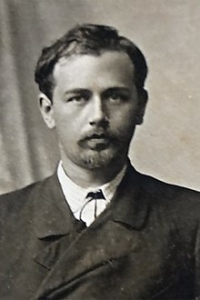
Mykola Dmytrovych Leontovych (Ukrainian: Микола Дмитрович Леонтович; sometimes spelt Leontovich; December 13 1877 – 23 January 1921) was a Ukrainian composer, choral conductor, and teacher of international renown. His music was inspired by Mykola Lysenko and the Ukrainian National Music School. Leontovych specialised in a cappella choral music, ranging from original compositions, to church music, to elaborate arrangements of folk music.
TVXQ

TVXQ, an initialism for Tong Vfang Xien Qi, is a South Korean male pop duo consisting of U-Know Yunho and Max Changmin. They are known as Tohoshinki in Japanese releases, and are sometimes referred to as DBSK, an abbreviation of their Korean name Dong Bang Shin Ki.
Jerome Kern
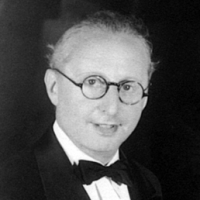
Jerome David Kern (January 27, 1885 – November 11, 1945) was an American composer of musical theatre and popular music. One of the most important American theatre composers of the early 20th century, he wrote more than 700 songs, used in over 100 stage works, including such classics as "Ol' Man River", "Can't Help Lovin' Dat Man", "A Fine Romance", "Smoke Gets in Your Eyes", "All the Things You Are", "The Way You Look Tonight", "Long Ago (and Far Away)" and "Who?". He collaborated with many of the leading librettists and lyricists of his era, including George Grossmith Jr., Guy Bolton, P. G. Wodehouse, Otto Harbach, Oscar Hammerstein II, Dorothy Fields, Johnny Mercer, Ira Gershwin and E. Y. Harburg.
A native New Yorker, Kern created dozens of Broadway musicals and Hollywood films in a career that lasted for more than four decades. His musical innovations, such as 4/4 dance rhythms and the employment of syncopation and jazz progressions, built on, rather than rejected, earlier musical theatre tradition. He and his collaborators also employed his melodies to further the action or develop characterization to a greater extent than in the other musicals of his day, creating the model for later musicals. Although dozens of Kern's musicals and musical films were hits, only Show Boat is now regularly revived. Songs from his other shows, however, are still frequently performed and adapted. Although Kern detested jazz arrangements of his songs, many have been adopted by jazz musicians to become standard tunes.
A native New Yorker, Kern created dozens of Broadway musicals and Hollywood films in a career that lasted for more than four decades. His musical innovations, such as 4/4 dance rhythms and the employment of syncopation and jazz progressions, built on, rather than rejected, earlier musical theatre tradition. He and his collaborators also employed his melodies to further the action or develop characterization to a greater extent than in the other musicals of his day, creating the model for later musicals. Although dozens of Kern's musicals and musical films were hits, only Show Boat is now regularly revived. Songs from his other shows, however, are still frequently performed and adapted. Although Kern detested jazz arrangements of his songs, many have been adopted by jazz musicians to become standard tunes.
Evanescence

Evanescence is an American rock band founded in Little Rock, Arkansas in 1995 by singer/pianist Amy Lee and guitarist Ben Moody.
After recording two private EPs and a demo CD named Origin, with the help of Bigwig Enterprises in 2000, the band released their first full-length album, Fallen, on Wind-up Records in 2003. Fallen sold more than 15 million copies worldwide and helped the band win two Grammy Awards. A year later, Evanescence released their first live album, Anywhere but Home, which sold more than one million copies worldwide. In 2006, the band released their second studio album, The Open Door, which has sold more than four million copies.
The band has suffered several line-up changes, including co-founder Moody leaving in 2003, followed by guitarist John LeCompt and drummer Rocky Gray in 2007. Lee is now the only original member of Evanescence remaining in the band.
After recording two private EPs and a demo CD named Origin, with the help of Bigwig Enterprises in 2000, the band released their first full-length album, Fallen, on Wind-up Records in 2003. Fallen sold more than 15 million copies worldwide and helped the band win two Grammy Awards. A year later, Evanescence released their first live album, Anywhere but Home, which sold more than one million copies worldwide. In 2006, the band released their second studio album, The Open Door, which has sold more than four million copies.
The band has suffered several line-up changes, including co-founder Moody leaving in 2003, followed by guitarist John LeCompt and drummer Rocky Gray in 2007. Lee is now the only original member of Evanescence remaining in the band.
Lara Fabian

Lara Fabian (born Lara Crokaert, January 9, 1970) is a Belgian-Italian international singer who holds Canadian citizenship. Multilingual, she sings in French, Italian and English. She has also sung in Spanish, Portuguese, Russian once in Hebrew on Israel's 60th Independence Day celebrations, and in German in 1988 for a version of "Croire" (ger.: "glauben" eng.: "believe"). She has sold over 18 million records worldwide.
Britney Spears

Britney Jean Spears (born 2 December 1981) is an American singer and entertainer. Born in McComb, Mississippi and raised in Kentwood, Louisiana, Spears first appeared on national television as a contestant on the Star Search program in 1992 and went on to star on the television series The New Mickey Mouse Club from 1993–1994. After a brief membership with the pop musical group Innosense, Spears signed a recording contract with Jive Records, releasing her debut album ...Baby One More Time in 1999 which debuted at number one on the Billboard 200.
The title-track of Spears's debut album and its accompanying music video also established her as an international sex symbol, garnering controversy over the influence of her public image on teenage girls.
Spears is ranked as the eighth best-selling female recording artist in the United States according to the Recording Industry Association of America with 31 million certified albums and one of the world's best-selling music artists having sold an estimated 83 million records worldwide.
The title-track of Spears's debut album and its accompanying music video also established her as an international sex symbol, garnering controversy over the influence of her public image on teenage girls.
Spears is ranked as the eighth best-selling female recording artist in the United States according to the Recording Industry Association of America with 31 million certified albums and one of the world's best-selling music artists having sold an estimated 83 million records worldwide.
David Foster
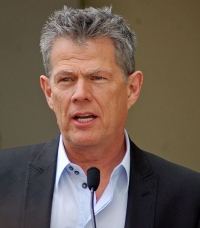
David Walter Foster, OC, OBC (born November 1, 1949), is a Canadian musician, record producer, composer, singer, songwriter and arranger, noted for discovering singers Celine Dion, Josh Groban, and Michael Bublé and for producing some of the most successful artists in the world.
George Bennard
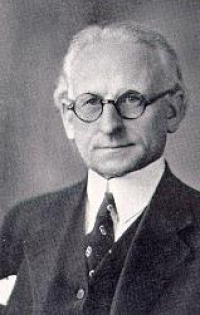
George Bennard (February 4, 1873 – October 10, 1958) was an American hymn composer and preacher. He is best known for composing the famous hymn, "The Old Rugged Cross".
Michael W. Smith
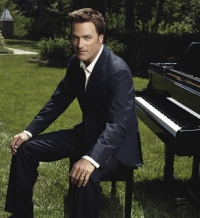
Michael W. Smith (born October 7, 1957) is a Grammy Award-winning American singer and songwriter. He is one of the best-selling and most influential artists in Contemporary Christian Music, and he has achieved considerable success in the mainstream music industry as well. Smith is a three-time Grammy Award winner, and he has earned 34 Dove Awards. Over the course of his 24-year career, he has sold more than 13 million albums and he has recorded 29 number-one hit songs, fourteen gold albums, and five platinum albums. Mr. Smith is an American Music Award recipient and he was named one of People magazine's most beautiful people.
Claude Joseph Rouget de Lisle
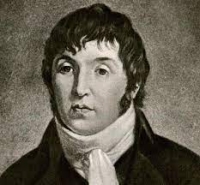
Claude Joseph Rouget de Lisle, sometimes spelled de l'Isle or de Lile, was a French army officer of the French Revolutionary Wars. He is known for writing the words and music of the Chant de guerre pour l'armée du Rhin in 1792, which would later be known as La Marseillaise and become the French national anthem.
Claude Debussy
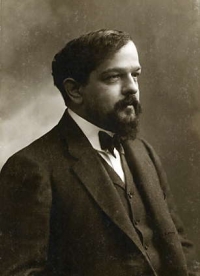
Achille-Claude Debussy (French pronunciation: ) (August 22, 1862 – March 25, 1918) was a French composer. Along with Maurice Ravel, he was one of the most prominent figures working within the field of impressionist music, though he himself intensely disliked the term when applied to his compositions. Debussy is not only among the most important of all French composers but also a central figure in European music at the turn of the twentieth century.
His music is noted for its sensory component and how it is not often formed around one key or pitch. Often Debussy's work reflected the activities or turbulence in his own life. His music virtually defines the transition from late-Romantic music to twentieth century modernist music. In French literary circles, the style of this period was known as symbolism, a movement that directly inspired Debussy both as a composer and as an active cultural participant.
His music is noted for its sensory component and how it is not often formed around one key or pitch. Often Debussy's work reflected the activities or turbulence in his own life. His music virtually defines the transition from late-Romantic music to twentieth century modernist music. In French literary circles, the style of this period was known as symbolism, a movement that directly inspired Debussy both as a composer and as an active cultural participant.
Casting Crowns
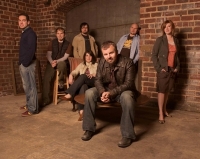
Casting Crowns is a Grammy award and Dove Award winning Christian band that employs a soft rock music style. The band was created in 1999 by youth pastor Mark Hall at First Baptist Church in Downtown Daytona Beach, Florida as part of a Youth Group. He also serves as a lead vocalist. Later they moved to McDonough, Georgia and more members joined creating the band now known as Casting Crowns. Some members of the band currently work as ministers for Eagles Landing First Baptist Church in McDonough, Georgia.
Discovered by, among others, contemporary Christian music legend Steven Curtis Chapman, Casting Crowns received a recording contract and vaulted to popularity in 2003 with their self-titled debut album Casting Crowns. The album quickly made them one of the fastest selling debut artists in Christian music history. Lifesong followed in 2005, debuting at #9 on the Billboard 200 Albums Chart. Both albums have been certified Platinum. The band's third album The Altar and the Door debuted at #2 on the Billboard 200 Albums Chart and #1 on the Hot Christian Albums chart upon its release in August 2007. Ten weeks after it came out it was certified Gold.
Casting Crowns has enjoyed tremendous success in the United States. They have released nine singles to date, seven of which have become consecutive number one hits on various Christian music charts. "Voice of Truth" spent a record-breaking fourteen consecutive weeks at #1 beginning in 2003. "Lifesong" spent nine weeks in the top spot, with "Praise You in This Storm" remaining at #1 for seven weeks. Casting Crowns broke their own record in 2007 when the single "East to West" from The Altar and the Door hit sixteen consecutive weeks at #1. The song ended up enjoying the top spot for a total of nineteen weeks, now their most successful single to date.
Discovered by, among others, contemporary Christian music legend Steven Curtis Chapman, Casting Crowns received a recording contract and vaulted to popularity in 2003 with their self-titled debut album Casting Crowns. The album quickly made them one of the fastest selling debut artists in Christian music history. Lifesong followed in 2005, debuting at #9 on the Billboard 200 Albums Chart. Both albums have been certified Platinum. The band's third album The Altar and the Door debuted at #2 on the Billboard 200 Albums Chart and #1 on the Hot Christian Albums chart upon its release in August 2007. Ten weeks after it came out it was certified Gold.
Casting Crowns has enjoyed tremendous success in the United States. They have released nine singles to date, seven of which have become consecutive number one hits on various Christian music charts. "Voice of Truth" spent a record-breaking fourteen consecutive weeks at #1 beginning in 2003. "Lifesong" spent nine weeks in the top spot, with "Praise You in This Storm" remaining at #1 for seven weeks. Casting Crowns broke their own record in 2007 when the single "East to West" from The Altar and the Door hit sixteen consecutive weeks at #1. The song ended up enjoying the top spot for a total of nineteen weeks, now their most successful single to date.
Franz Schubert

Franz Peter Schubert (German pronunciation: ; January 31, 1797 – November 19, 1828) was an Austrian composer. He wrote some 600 Lieder, nine symphonies (including the famous "Unfinished Symphony"), liturgical music, operas, some incidental music, and a large body of chamber and solo piano music. He is particularly noted for his original melodic and harmonic writing.
Schubert was born into a musical family, and received formal musical training through much of his childhood. While Schubert had a close circle of friends and associates who admired his work (amongst them the prominent singer Johann Michael Vogl), wide appreciation of his music during his lifetime was limited at best. He was never able to secure adequate permanent employment, and for most of his career he relied on the support of friends and family. He made some money from published works, and occasionally gave private musical instruction. In the last year of his life he began to receive wider acclaim. He died at the age of 31 of "typhoid fever", a diagnosis which was vague at the time; several scholars suspect the real illness was tertiary syphilis.
Interest in Schubert's work increased dramatically in the decades following his death. Composers like Franz Liszt, Robert Schumann and Felix Mendelssohn discovered, collected, and championed his works in the 19th century, as did musicologist Sir George Grove. Franz Schubert is now widely considered to be one of the greatest composers in the Western tradition.
Schubert was born into a musical family, and received formal musical training through much of his childhood. While Schubert had a close circle of friends and associates who admired his work (amongst them the prominent singer Johann Michael Vogl), wide appreciation of his music during his lifetime was limited at best. He was never able to secure adequate permanent employment, and for most of his career he relied on the support of friends and family. He made some money from published works, and occasionally gave private musical instruction. In the last year of his life he began to receive wider acclaim. He died at the age of 31 of "typhoid fever", a diagnosis which was vague at the time; several scholars suspect the real illness was tertiary syphilis.
Interest in Schubert's work increased dramatically in the decades following his death. Composers like Franz Liszt, Robert Schumann and Felix Mendelssohn discovered, collected, and championed his works in the 19th century, as did musicologist Sir George Grove. Franz Schubert is now widely considered to be one of the greatest composers in the Western tradition.
 Daily Sheet Music is a web site for those who wants to access popular sheet music easily,
letting them download the sheet music for free for trial purposes.
It's completely free to download and try the listed sheet music, but you have to delete the files after 24 hours of trial period.
Don't forget, if you like the piece of music you have just learned playing,
treat the artist with respect, and go buy the original sheet music.
Daily Sheet Music is a web site for those who wants to access popular sheet music easily,
letting them download the sheet music for free for trial purposes.
It's completely free to download and try the listed sheet music, but you have to delete the files after 24 hours of trial period.
Don't forget, if you like the piece of music you have just learned playing,
treat the artist with respect, and go buy the original sheet music.